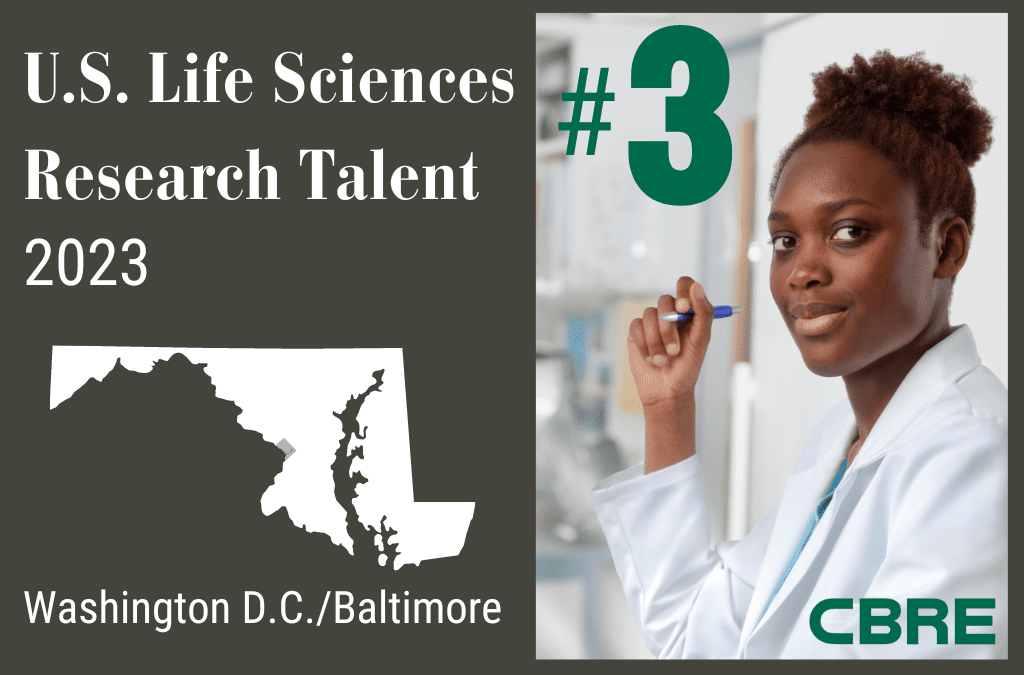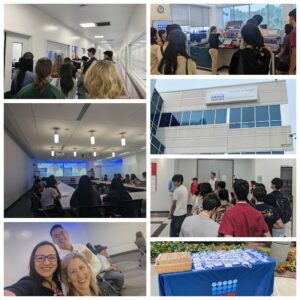
Why the Maryland Region Was Ranked #3 for Top Life Sciences Research Talent by CBRE
June 13, 2023
According to CBRE’s latest report on the Top 25 U.S. Markets for Life Sciences Research Talent, the Washington D.C./Baltimore region has maintained its position as the number 3 market for research talent in the United States, behind Boston/Cambridge (#1), the San Francisco Bay Area (#2).
The Washington D.C./Baltimore region has attracted a highly educated workforce and has become a magnet for life sciences research with world-class universities, the highest concentration of federal research institutions, and 500+ life science companies like NextCure & AstraZeneca, including a robust cell and gene therapy sector with companies such as Kite Pharma, American Gene Technologies (who recently spun out AddImmune to advance their HIV Cure program).
The life sciences research field in the United States continues to experience steady growth, with a record 3.1% increase in professionals last year. This surge outpaces the 2.2% overall increase across all occupations in the country [1].
Despite potential economic slowdowns, the life sciences research talent market remains remarkably tight, showing resilience even during past recessions. With younger demographics, higher salaries, and promising wage growth, life sciences researchers are carving out a unique space within the U.S. workforce.
“Throughout any portion of a cycle, access to deep pools of specialized talent is priority number one. The Washington, D.C./Baltimore region remains a top three market for this critical ingredient and will continue to attract users and investors alike,” shared Tommy Cleaver, executive vice president of CBRE, said in a statement to the commercial observer.
Let’s delve into why Washington D.C./Baltimore stands out in this rapidly growing field.
Education and Universities:
One key factor behind Washington D.C./Baltimore’s success in the life sciences realm is its outstanding educational institutions. The area is home to renowned universities and research institutions that fuel innovation and attract bright minds. Institutions such as the University of Maryland, Johns Hopkins University, University of Maryland Baltimore County (UMBC) and George Washington University offer cutting-edge programs and opportunities for research and collaboration.
Maryland also has a strong community college system, including Montgomery College (MC) and Frederick Community College (FCC), with specific programs that feed into many of the four-year Universities or provide a pathway directly into research associate or lab tech jobs through their industry-specific programs. MC has a collaboration with UMBC to provide an educational pathway for students to advance directly into the TLST program run out of the Universities of Shady Grove.
MC is also home to advanced research skills training with Bio-Trac, a program which touts an incredible record of training over 18,000 research scientists through their hands-on research workshops. Scientist from around the world travel to get training from renowned researchers on the most advanced research techniques, including; Gene Editing with CRISPR, Antibody Validation and Characterization, Flow Cytometry: Principles, Methods and Applications, Multiplex Immunofluorescence in Immune Oncology, and more.
In 2021, the area produced the highest number of biotechnology graduates in the country, with 582 individuals entering the workforce. This achievement bodes well for meeting the increasing demand for skilled workers in the life sciences industry and further strengthening the region’s position as a biotech powerhouse[1].
A Strong & Growing Talent Pool:
The report highlights the remarkable growth of the life sciences research workforce in the D.C./Baltimore region. Between 2017 and 2022, the number of life sciences research workers in the area increased by 19%, outpacing the national growth rate of 16%. This upward trajectory reflects the region’s commitment to fostering an environment conducive to scientific advancement and attracting top talent[^1^].
Further according to the report, the region boasts a substantial pool of life sciences research talent. With a total of 30,240 life sciences researchers, the D.C./Baltimore area clinched the fourth spot in the nation for the largest pool of such talent. This achievement underscores the region’s commitment to fostering a thriving research ecosystem and attracting top-notch professionals from around the country and the world[1].
“Recruiting and hiring research talent can be challenging because of the very niche nature of the research and technical requirements for each company,” shared Chris Frew, CEO at Workforce Genetics, one of the region’s leading life science search firms. “Many of our clients have found that the DC/Baltimore region has been a competitive advantage for them in hiring research talent. If we do have to expand our search to other markets, we have also found that candidates are interested in relocating to Maryland because of the moderate cost of living, the diversity, the quality of life, great schools and of course the strong biotech market.”
Supportive Ecosystem:
The success of the D.C./Baltimore region in the life sciences sector is also attributed to its supportive ecosystem. The presence of world-class hospitals, research institutions, and funding opportunities fosters collaboration and innovation that fuel the industry and foster a strong workforce.
For example, TEDCO, Maryland’s economic engine for life science and technology companies, provides important early funding support to help startups commercialize and grow in Maryland. A study by the University of Baltimore’s Jacob France Institute, the study found that TEDCO’s investments have supported 10,433 Maryland jobs and more than $2.3 billion in statewide economic activity as of 2021.
State supported internship programs, such as the MTIP program that is managed by UMBC, help young emerging researchers to get real world industry experience by funding half of their internship with local life science companies.
Washington D.C./Baltimore has cemented its position as a leading region for life science research talent. With its exceptional educational institutions, a growing workforce, and a supportive ecosystem, the area continues to attract researchers, investors, and businesses alike. As the demand for life sciences research workers remains robust and the region’s commitment to scientific advancement persists, Washington D.C./Baltimore is poised to play a pivotal role in shaping the future of the life sciences industry.
References: CBRE. (2023). U.S. Life Sciences Research Talent 2023. Retrieved from CBRE report
- About the Author
- Latest Posts
BioBuzz is a community led, experience focused, biotech and life sciences media and events company. BioBuzz highlights regional breaking news, industry professionals, jobs, events, and resources for business and career growth. Their weekly newsletter is subscribed to by thousands in the BioHealth Capital Region and Greater Philadelphia as the go-to for industry updates.








